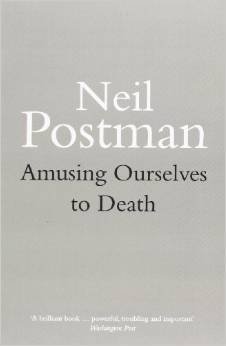Amusing Ourselves to Death: Public Discourse in the Age of Showbusiness

Author: Neil Postman
Television has conditioned us to tolerate visually entertaining material measured out in spoonfuls of time, to the detriment of rational public discourse and reasoned public affairs. In this eloquent, persuasive book, Neil Postman alerts us to the real and present dangers of this state of affairs, and offers compelling suggestions as to how to withstand the media onslaught….Read More
6 Books Similar to Amusing Ourselves to Death: Public Discourse in the Age of Showbusiness

The Omnivore’s Dilemma
Providing an exploration of the American food industry, this book brings a fresh perspective to the question 'what shall we have for dinner?'. It follows each food chain, tracing the… Continue Reading Posted in: Bibliography, Dinners And Dining, Evolution
Polaroids From The Dead
A collection of essays by Douglas Coupland, whose first novel Generation X received critical acclaim. In his mid-30s, Coupland writes about what it means to grow up and the realization… Continue Reading Posted in: Contemporary Short Stories, Popular Culture, Short Stories, Social Aspects
Man’s Search for Meaning
When Beacon Press first published Man's Search for Meaning in 1959, Carl Rogers called it "one of the outstanding contributions to psychological thought in the last fifty years." In the… Continue Reading Posted in: Bibliography, Biography, Concentration Camps
Shampoo Planet
Tyler Johnson is a 20-year-old MTV child. Once a baby raised in a hippie commune, he is now an ambitious Reagan youth dreaming of a career with the corporation whose… Continue Reading Posted in: American Fiction, American Literature, Black Humor (Literature), Dark Humor


Leave a Reply
You must be logged in to post a comment.